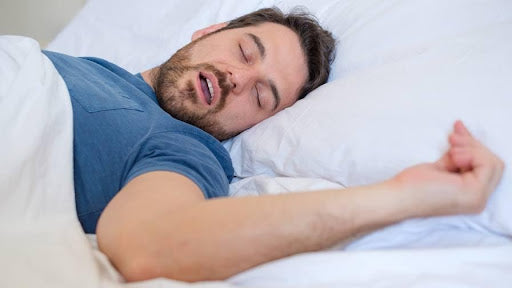ARE OBSTRUCTIVE SLEEP APNEA (OSA) AND TEETH GRINDING RELATED?
Aug 31, 21

You woke up in the morning with sore jaw muscles, don’t know why? This may be because you were grinding your teeth at night. You might feel more tired during the day but you may not realize what is happening. In some cases, the teeth will rub against each other due to the misalignment of the jaws or teeth.
In some cases, teeth grinding is also associated with Obstructive Sleep Apnea (OSA) as the person wakes up frequently during the night when your respiratory system shuts down and interferes with your breathing. The National Sleep Foundation estimates that one in four Obstructive Sleep Apnea patients also have signs of bruxism or teeth grinding.
Obstructive Sleep Apnea
Obstructive sleep apnea (OSA) is a condition in which your breathing stops unconsciously for a short time while you sleep. Normally, the air in the mouth and nose will always enter the lungs. The stage where breathing stops is called apnea or apnea episodes. With Obstructive Sleep Apnea, normal airflow will repeatedly tend to stop throughout the night. Since the airway in the throat is too narrow, the airflow stops. Snoring is very common in OSA. Sleep bruxism is also an oral health problem, but it is also regarded as a sleep-related movement disorder, which is characterized by involuntary and uncontrolled body movement during sleep (in this case, jaw movement). People suffering from Obstructive Sleep Apnea experience many of these warning signs and are even known to grind teeth at night. According to the National Sleep Foundation, approximately one-quarter of patients with Obstructive Sleep Apnea suffer from bruxism during sleep.
Common Symptoms of Sleep Apnea & Teeth Grinding
If you often wake up from headaches, earaches, fatigue, tight jaw muscles, or tooth sensitivity, you are more likely to grind your teeth at night. Bruxism can also manifest as tooth wear and deformity. On the other hand, sleep apnea is more difficult to detect. Some common signs of Obstructive Sleep Apnea are:
- Loud snoring
- Tired after a good night’s sleep, excessive daytime sleepiness (insomnia)
- Difficulty in falling asleep (insomnia)
- Dry mouth, sore throat or headache when waking up
- Sometimes suffocation or difficulty breathing when waking up
- Waking up often to go to the bathroom.
- Problems with concentration and memory
- Increased irritability and mood swings
The link between Obstructive Sleep Apnea(OSA) and tooth grinding
Many studies have shown that the proportion of people with OSAS and sleep-related bruxism is higher than expected. Epidemiological studies with a medical history and data sets have shown that many patients with OSAS have a tendency to grind their teeth. Although not all of these studies have found the same frequency. Coincidentally, they show a general pattern that indicates a correlation between teeth grinding and sleep apnea. Polysomnography performed in specialized sleep monitoring clinics is more reliable than other studies based on interviews with patients with sleep apnea or bruxism.
It is believed that when our air passage is blocked, the body responds to stress signals. These stress hormones are spread in the blood and eventually cause the jaw muscles to contract. This muscle tension creates friction between the upper and lower rows. Bruxism can also occur when Obstructive Sleep Apnea, snoring, or partial obstruction (hypopnea) interferes with the upper airway. Here, the brain also absorbs this pressure and instructs the mandibular muscles to contract the soft tissues of the neck so that air can flow freely.
Men usually have more severe Sleep Apnea and may show a stronger arousal response, which may explain the higher rate of grinding teeth in men. In addition, men tend to report more sleep apnea symptoms than women, such as snoring, loud purring, and Sleep Apnea.
Other factors that may help explain the link between sleep apnea and teeth grinding include anxiety and caffeine intake. Anxiety can cause bruxism, and it is well known that untreated Sleep Apnea can cause mood disorders such as depression and anxiety. Daytime sleepiness caused by Sleep Apnea can lead to caffeine intake, which is also associated with a high risk of bruxism.
Risks of Continued Sleep Apnea & Teeth Grinding
If left untreated, sleep apnea can lead to other serious health problems, such as type 2 diabetes, acid reflux, poor immune function, mental health problems, memory loss, and an increased risk of stroke or heart failure. Apart from these, the sensitive teeth can also break, lose or wear down.
It can also affect enamel, crowns and fillings in the long run. By following several remedies, one can cure Obstructive Sleep Apnea thereby improving their sleep quality.
Remedies for Eliminating Obstructive Sleep Apnea for Improved Sleep Quality
- Coping with stress (especially bruxism is a response to stress and anxiety)
- Lose weight and maintain a normal weight (obesity increases the likelihood of airway obstruction and narrowing of the nasal passages)
- Try yoga (improve breathing and oxygen flow)
- Limit alcohol consumption (alcohol relaxes the throat muscles, causes snoring and disrupts the sleep cycle, and causes airway inflammation by obstructing breathing)
- Heavy smoking (tobacco causes sore throat and swelling)
- Change your sleeping position
Sleep apnea can also be cured with the help of CPAP Machine
Try these remedies to improve sleep quality and work with your dentist (or your child's paediatric dentist) to analyze your symptoms and find the solution that works best for you. . Are you worried about your sleep health and looking for extensive sleep care? Contact us not and our sleep consultants will help you out!


